Departmental news
WMG Professor joins Clean Growth Leadership Network
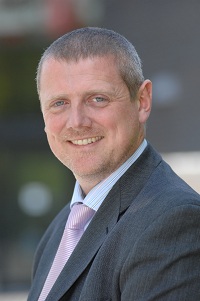 Head of WMG’s Sustainable Materials and Manufacturing Research Group, Professor Kerry Kirwan, has been appointed as a Fellow to the Clean Growth Leadership Network (CGLN).
Head of WMG’s Sustainable Materials and Manufacturing Research Group, Professor Kerry Kirwan, has been appointed as a Fellow to the Clean Growth Leadership Network (CGLN).
The CGLN is committed to economic growth for all whilst substantially reducing carbon emissions. The world-class network is made up of Founders, Fellows, Partners and Members united in their commitment to transform to a global clean economy.
Professor Kirwan explains: “I am delighted to have been appointed as a Fellow of the Clean Growth Leadership Network – the opportunity to work with some of the UK’s leading thinkers and practitioners tackling critical issues on the climate change agenda is hugely exciting. I’m really looking forward to introducing them to our research here at WMG and the wider University.”
Professor Kirwan is a specialist in circular economy, sustainable materials, polymer processing and industrial applications. He has extensive experience of developing environmentally friendly materials for application within numerous industries.
Read more about WMG’s Sustainable Materials and Manufacturing research here: Sustainable materials and manufacturing (warwick.ac.uk)
WMG Professors help tackle Net Zero solutions ahead of COP26
Ahead of COP26, voices across the political spectrum and from a range of leading UK universities have come together to produce a unique collection of essays focusing on Net Zero solutions.
Each is co-written by an academic and a Parliamentarian and sets out the areas where work is still needed on climate policy and demonstrates how readily to hand many policy and technical solutions are. It showcases the strength of UK science and research and the level of cross-party support for climate action.
Two WMG Professors have produced essays as part of the series. Professor David Greenwood together with Lilian Greenwood MP, has written ‘Driving the electric vehicle revolution’, and Professor Kerry Kirwan has, with Ben Lake MP, written ‘Overcoming barriers to the circular economy’.
Caroline Lucas MP, Chair of the APPG on Climate Change, explains: “The APPG on Climate Change was founded to coincide with the passing of the 2008 Climate Change Act – a vote that achieved almost unanimous support from across the political spectrum. As current Chair of the APPG on Climate Change, I see great value in striving to maintain and build upon this cross-party consensus where possible. We won’t all agree on the necessary course of action in each sector. And we may not even agree on the speed or scale with which it is necessary to reduce emissions. But we share a common conviction that the climate crisis is a challenge that can and must be surmounted. Deeper engagement between parliamentarians and the scientific community is a vital step in ensuring that we do. It is in that spirit that I fully endorse the work that has gone into producing this collection of essays.”
 In his essay, co-authored with Lilian Greenwood MP, Professor David Greenwood, CEO of WMG High Value Manufacturing Catapult at the University of Warwick explains: “Whilst the coronavirus pandemic has resulted in devastating personal and economic impacts, it has also caused us to challenge some of our preconceptions. The public has experienced clean air as a result of reduced transport and industrial emissions. People have taken to their bikes in record numbers and with the trials of rental e-scooters there’s a real opportunity for them to replace car and public transport usage for short journeys - at least in good weather.
In his essay, co-authored with Lilian Greenwood MP, Professor David Greenwood, CEO of WMG High Value Manufacturing Catapult at the University of Warwick explains: “Whilst the coronavirus pandemic has resulted in devastating personal and economic impacts, it has also caused us to challenge some of our preconceptions. The public has experienced clean air as a result of reduced transport and industrial emissions. People have taken to their bikes in record numbers and with the trials of rental e-scooters there’s a real opportunity for them to replace car and public transport usage for short journeys - at least in good weather.
“These behavioural shifts, along with the persistent drivers of air quality and climate change reinforce the shift to EVs.”
 Kerry Kirwan, WMG’s Professor of Sustainable Materials and Manufacturing explains: “Given the continued focus on how we use our limited planetary resources, the potential for green business models and practices to help our economic recovery post-pandemic and the imminence of COP26, it is great to see such a breadth of collected thinking coming together in this publication – it was a really valuable exercise that I am very pleased to have been part of”.
Kerry Kirwan, WMG’s Professor of Sustainable Materials and Manufacturing explains: “Given the continued focus on how we use our limited planetary resources, the potential for green business models and practices to help our economic recovery post-pandemic and the imminence of COP26, it is great to see such a breadth of collected thinking coming together in this publication – it was a really valuable exercise that I am very pleased to have been part of”.
Read the report and essays in full here: https://www.policyconnect.org.uk/research/net-zero-exchanges-connecting-policy-and-research-climate-action
About the APPCCG
The All-Party Parliamentary Climate Change Group runs events and activities in parliament with the purpose of advancing understanding of policy issues surrounding climate change and enabling cross-party discussion and action on climate policy.
This is not an official feed of the House of Commons or the House of Lords. It has not been approved by either House or its committees. All-Party Parliamentary Groups, forums and commissions are informal groups of Members of both Houses with a common interest in particular issues. The views expressed in the webpages are those of the groups.
About Policy Connect
Policy Connect is a membership-based, not-for-profit, cross-party think tank.
We bring together parliamentarians and government in collaboration with academia, business and civil society to inform, influence and improve UK public policy through debate, research and innovative thinking, so as to improve peoples’ lives.
We lead and manage an extensive network of parliamentary groups, research commissions, forums and campaigns. We are a London living wage and disability confident employer and a Member of Social Enterprise UK, and have been operating since 1995. Our work focuses on key policy areas including: health & accessibility; education & skills; industry, technology & innovation; and sustainability.
We shape policy in Westminster through meetings, events, research and impact work.
WMG research is acknowledged at important industrial awards
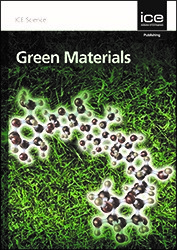 WMG Professor Ton Peijs’s paper entitled: “Turning low-cost recycled paper into high-value binder-free all-cellulose panel products” has been awarded the prestigious Green Materials Journal Prize by IEC Publishing, part of the Institute of Civil Engineers.
WMG Professor Ton Peijs’s paper entitled: “Turning low-cost recycled paper into high-value binder-free all-cellulose panel products” has been awarded the prestigious Green Materials Journal Prize by IEC Publishing, part of the Institute of Civil Engineers.
The IEC Awards recognise research of exceptional quality and benefit to the civil engineering, construction and materials science community.
Professor Peijs will be officially presented with the award at a ceremony in London in October.
Ton Peijs is a Professor of Polymer Engineering and Director of the National Polymer Processing Centre at WMG. His research focuses mainly on materials and processing innovations in polymers and composites. Ton has made notable contributions to areas such as hybrids, multifunctional materials, damage tolerance and durability, natural fibres and bio-based materials, polymer fibres and nanocomposites. He has also pioneered the development of sustainable composites, including the development of fully recyclable all-polymer composites.
Read Professor Peijs’s paper in full here: Turning low-cost recycled paper into high-value binder-free all-cellulose panel products | Green Materials (icevirtuallibrary.com)
Read more about WMG’s plastics research here: Plastics (warwick.ac.uk)
Chitin can be successfully extracted from Black Soldier Fly husks
- Chitin comes from the husks of Black Soldier Fly Larvae, which are waste products of black soldier fly farming
- Black soldier fly farming is commonly done in parts of Africa and South East Asia, as they are used as a source of protein for livestock, therefore, to be able to use the husks could create a new economic opportunity
- The extraction process gives comparable quality material to other feedstocks, and extracts 50% of the available chitin in the husks researchers from WMG, University of Warwick have found
Chitin is a naturally occurring polymer from the husks of Black Soldier Fly larvae, usually considered a waste product from the farming of the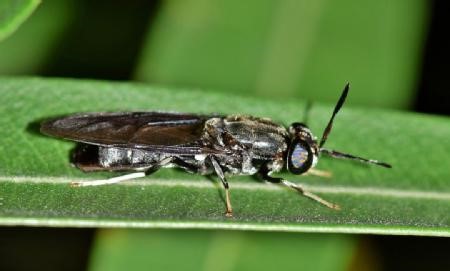 Black Soldier Fly larvae. However, researchers from WMG at the University of Warwick decided to see if they could extract chitin from the husks, creating a new economic opportunity.
Black Soldier Fly larvae. However, researchers from WMG at the University of Warwick decided to see if they could extract chitin from the husks, creating a new economic opportunity.
Chitin is a sustainable source of protein in countries in South East Asia and south parts of Africa. When extracted it can be characterised and used in the biomedical industry, for example to make antiseptics and anticancer treatments.
In the report, ‘Purification of chitin from Black Soldier Fly larvae husks’, researchers from WMG at the University of Warwick have successfully extracted chitin from the husks of Black Fly Soldiers.
The extraction route developed in this work obtains around 50% of the total available chitin, which is comparable to existing processes.
Dr Stuart Coles, from WMG at the University of Warwick comments:
“We have found a new way of extracting chitin from the husks of Black Soldier Flies, which are commonly farmed in parts of Africa and South East Asia as they can be used as a source of protein for livestock.
“Chitin can be used to make antiseptics and anticancer treatments, so to be able to extract it from the husks which are a by-product of the farming process means that there’s potential to be more sustainable by using what would usually go to waste.”
The extraction process that the researchers developed at WMG used cheap and readily available materials to reduce the cost whilst still producing a high-quality material.
Dr Stuart Coles explains:
“The process involved the use of mild, readily available and inexpensive chemicals to breakdown the natural structure of the husk and allowed us to isolate the chitin. In isolating the chitin, we only used water as a solvent, and a large part of our work focused on reducing the amount of water being used as it is a critical resource in countries where Black Soldier Flies are farmed.”
Research can now continue to investigate how to commercialise the extraction process into a larger process.
ENDS
27 APRIL 2021
NOTES TO EDITORS
High-res images available at:
https://warwick.ac.uk/services/communications/medialibrary/images/april_2021/fly-1627592_1920.jpg
Caption: A Black Soldier Fly
Credit: Brett Hondow, Pixabay
For further information please contact:
Alice Scott
Media Relations Manager – Science
University of Warwick
Tel: +44 (0) 7920 531 221
E-mail: alice.j.scott@warwick.ac.uk
UK plastic recycling company receives £4.42m Government funding from Innovate UK for ground-breaking advanced recycling plant in the North East England
Advanced recycling company ReNew ELP, based in Teesside, has been awarded a £4.42 million grant from Innovate UK, the UK’s innovation agency, to build the world’s first commercial-scale plastic recycling plant using Cat-HTR™ technology. Focussing on the UK Government’s priority to drive economic growth through new technology, the award comes through the Industrial Strategy Challenge Fund’s Smart Sustainable Plastic Packaging programme. It recognises the commercial-scale feasibility of the technology and potential of the advanced recycling sector to help meet ambitious plastic recycling targets. The grant will aid ReNew ELP in the construction of the initial plant, which commences build in Q1 2021 and will see c. 80,000 tonnes of waste plastic recycled annually upon completion.
The technology, Cat-HTR™ (Catalytic Hydrothermal Reactor), uses supercritical water, heat and pressure to convert waste plastic considered ‘unrecyclable’ through traditional mechanical means back into the valuable chemicals and oils from which it was made, for use in the petrochemical industry in the production of new plastic and other materials. This helps to create a circular economy for waste plastic.
Rebecca Pow MP, Under-Secretary of State for Defra says: “The Government is committed to both clamping down on the unacceptable plastic waste that harms our environment and ensuring more materials can be reused instead of being thrown away. By investing in these truly ground-breaking technologies we will help to drive these efforts even further, and I look forward to seeing them develop and deliver real results.”
A key benefit of the Cat-HTR™ technology is its ability to recycle multi-layer, flexible plastic materials such as films, and pots, tubs and trays (PTT), considered unrecyclable through traditional mechanical recycling, and are instead sent to landfill or incineration. Vitally, new materials made from ReNew ELP’s advanced recycling feedstock are suitable for use in food-contact packaging material, a problem area for mechanical recycling systems whose products do not meet European Food Standard Agency requirements.
In line with the Government’s policy of ‘Producer Pays’, Cat-HTR™ offers a solution to producers, retailers and brand owners levied with the expected Plastic Packaging Tax, which enforces a 30% recycled content requirement for all plastic packaging in both the UK and pre-filled from overseas from 2022, alongside
Extended Producer Responsibility (EPR), which challenges those in the plastic value chain to pay the full net cost of waste material collection and recycling. Advanced recycling company ReNew ELP offers a beneficial technology to help increase the recycled content of packaging and provide a recycling solution for plastic packaging materials such as flexible films, pots, tubs and trays.
Alongside diverting plastic away from polluting the environment, the Cat-HTR™ technology represents significant overall environmental benefit. Initial independent studies have already shown that advanced recycling can reduce CO2 emissions by 1.5 tonnes for every tonne of plastic waste processed when compared to incineration. This means that the completed ReNew ELP site at Wilton will save approximately 120,000 tonnes of CO2 annually, when compared to incineration. Environmental benefits include:
· Reducing plastic pollution of the natural environment
· 1.5 tonnes CO2 emissions saving per tonne of plastic processed via advanced recycling when compared to incineration
· An increased scope of recyclable plastics, including those classed as ‘unrecyclable’
· As Cat-HTR™ is not a combustion process, it does not produce toxic by-products such as dioxins
· A reduction on fossil sourced feedstock for the manufacture of new plastics
· High yields - up to 85% of the mass of plastic is converted to hydrocarbon products
· Minimal waste is produced- impurities (colourants, additives, fillers etc.) in the plastic feedstock fall out into the heavier hydrocarbon feedstocks, which can be used in construction
WMG at the University of Warwick partner on the project, conducting detailed Life Cycle Assessments (LCAs) to quantify the benefits of advanced recycling across multiple environmental indicators.
 Dr Stuart Coles, Associate Professor of Sustainable Materials who is leading the project in WMG at the University of Warwick says, “WMG will also be investigating what materials can be manufactured from the
Dr Stuart Coles, Associate Professor of Sustainable Materials who is leading the project in WMG at the University of Warwick says, “WMG will also be investigating what materials can be manufactured from the
Cat-HTR™ output streams. We will be able to link previously difficult to dispose of plastic materials to added-value products and demonstrate their potential through our characterisation and testing facilities.”
The technology demonstrates a complementary solution to sit alongside traditional mechanical recycling to create a circular economy. It also offers those in the plastic supply chain an alternative means for disposing of their flexible and multi-layer plastic packaging, which no longer needs to be incinerated or sent to landfill but can instead be recycled. This new process goes hand in hand with efforts to reduce single-use plastic and helps to create a plastic-neutral society.
ReNew ELP Managing Director Richard Daley says: “This Grant demonstrates we are in line with Government Policy and its drive towards achieving increased recycling targets in the UK. It will increase investor confidence, help innovative technologies such as ours break through and establish the Advanced Recycling Industry in the UK, helping ReNew ELP to emerge as a global leader in plastic recycling.”
WMG Professor takes on new role as Deputy PVC (Research) for Knowledge Exchange and Partnerships
Professor Kerry Kirwan has been appointed as the new Deputy Pro-Vice Chancellor (Research) for Knowledge Exchange and Partnerships, for the University of Warwick.
Knowledge exchange, industry partnerships and innovation are key components of much of the University’s research, with Professor Kirwan appointed to support this growing area.
Kerry, a Professor at WMG is also a Director of the £11m EPSRC Centre for Doctoral Training in Sustainable Materials and Manufacturing (EngD), Strategic Director of the £10m Industrial Doctorate Centre and Head of WMG’s Sustainable Materials and Manufacturing Research Group. He also sits on the University’s Research Executive Group.
Professor Kirwan is actively involved in the newly emerging Knowledge Exchange Framework programme, Monash-Warwick Alliance, Warwick in Europe, the Global Challenges Research Fund, Midlands Innovation, Energy Research Accelerator (ERA) and the Innovative Manufacturing and Future Materials GRP.
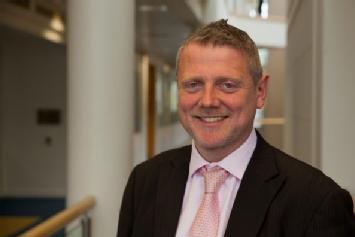 Speaking about his new appointment, Professor Kirwan said: “I am delighted to take up this position and very much look forward to continuing to work with the Pro-Vice Chancellor for Research to ensure we continue to grow our knowledge exchange, innovation and business and industry partnerships, and ultimately advance the outstanding research achievements of the University.”
Speaking about his new appointment, Professor Kirwan said: “I am delighted to take up this position and very much look forward to continuing to work with the Pro-Vice Chancellor for Research to ensure we continue to grow our knowledge exchange, innovation and business and industry partnerships, and ultimately advance the outstanding research achievements of the University.”
Professor Pam Thomas, Pro-Vice Chancellor (Research), commented: “Professor Kirwan will play a critical role and his skills and experience will be instrumental in furthering the development of Warwick as a leading research-intensive University with strong industry partnerships – locally, nationally and globally.”
Construction greener and more efficient with intelligent software
Construction vehicles could become more efficient and environmentally-friendly, thanks to new technology developed by WMG at the University of Warwick.
Through a new Innovate UK research programme, WMG in collaboration with partners JCB and Pektron PLC are working to optimise the fuel economy of the next generation of off-highway vehicles.
 Dr James Marco from WMG is leading the University’s contribution to the project that aims to introduce new intelligent power systems for improved engine operation.
Dr James Marco from WMG is leading the University’s contribution to the project that aims to introduce new intelligent power systems for improved engine operation.
This could lead to significant fuel savings and fewer carbon emissions for the industry.
Dr Marco’s team is analysing JCB’s current fleet to better understand the opportunities for emissions reduction and intelligent control.
Today’s construction industry is more environmentally-conscious than ever, and the amount of CO2 emissions released by vehicles is a significant factor in deciding which ones to use during an assignment.
WMG Professor heads to key automotive summit
 Professor Kerry Kirwan, Head of Sustainable Materials and Manufacturing, will be representing WMG at SMMT’s International Automotive Summit on Wednesday (29 June).
Professor Kerry Kirwan, Head of Sustainable Materials and Manufacturing, will be representing WMG at SMMT’s International Automotive Summit on Wednesday (29 June).
The Summit takes place at IET London and is one of the key events in the automotive calendar. Professor Kirwan will sit alongside experts from Jaguar Land Rover and TRW Aftermarket UK on the Automotive and the Circular Economy Panel.
More information and the full agenda can be found here.
WMG plays key role in £20 million announcement backing British Automotive battery manufacturing
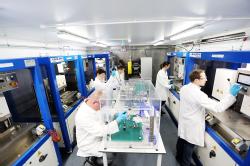 WMG at the University of Warwick are delighted to be part of a £19.4m project to support the development of next-generation electric vehicle batteries in the UK, funded through the Advanced Propulsion Centre (APC UK Ltd).
WMG at the University of Warwick are delighted to be part of a £19.4m project to support the development of next-generation electric vehicle batteries in the UK, funded through the Advanced Propulsion Centre (APC UK Ltd).
The funding will support leading edge manufacturing research focussed around Nissan's Sunderland battery manufacturing plant - the largest full scale automotive Li-ion battery manufacturing facility in Europe. WMG researchers will play a key role in helping Nissan take forward this opportunity and will receive £1m for the research.
The consortium led by Nissan with WMG at the University of Warwick, Hyperdrive, Newcastle University, and Zero Carbon Futures (ZCF), will bring together engineers, researchers, new technology and existing facilities, assets and knowledge to create and prove new and improved manufacturing processes for the next generation of automotive batteries.
WMG has particular skills around battery chemistry and the manufacturing processes used to scale this up to high volume production. WMG role in the project will be to investigate potential improvements to battery chemistry and increasing manufacturing yield, and to optimise automated manufacturing processes to enable Nissan to remain at the forefront of electric vehicle technology.
Lean, Mean and Green
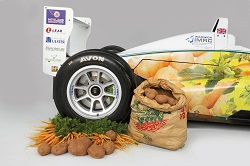 Dr Kerry Kirwan is proud to be representing WMG at a special seminar for The Institute of Materials, Minerals and Mining (IOM3) Coventry and Warwickshire Materials Society on Monday 3 November.
Dr Kerry Kirwan is proud to be representing WMG at a special seminar for The Institute of Materials, Minerals and Mining (IOM3) Coventry and Warwickshire Materials Society on Monday 3 November.
Dr Kirwan’s ‘Dispelling The Myth That Sustainable Materials Are Inferior…’ will use Warwick’s WorldF3rst racing project to show what can be achieved with sustainable, natural and recycled materials.
